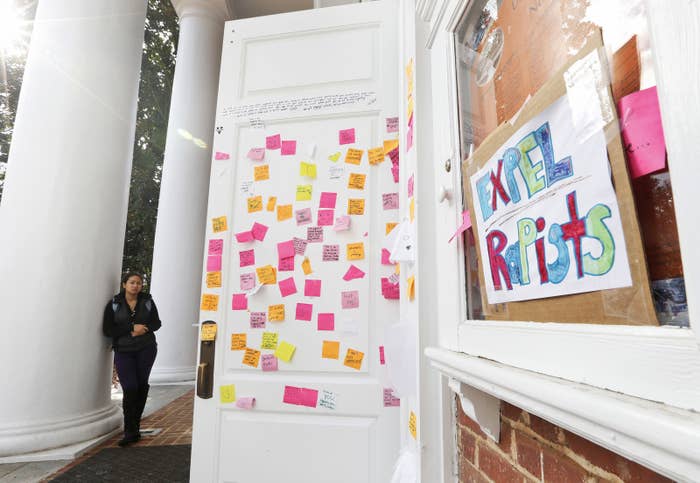
Attorneys defending Rolling Stone in a libel case will be allowed to use a controversial interview between a student journalist and Nicole Eramo, the University of Virginia administrator who is suing the magazine over a retracted article about campus rape.
The trial in Eramo’s $7.8 million defamation suit against Rolling Stone and reporter Sabrina Rubin Erdely begins Monday in Charlottesville and refocuses attention on the story of an alleged gang rape of a woman identified in the article as Jackie. The story rocked the campus, but the circumstances of the assault as described in Erdely’s November 2014 story “A Rape on Campus” were discredited by other media outlets and by local police. Rolling Stone retracted the 9,000-word article in April 2015.
US District Judge Glen E. Conrad issued several rulings Thursday about what evidence he’s permitting in the trial. In a boon to Eramo, Conrad will allow a report by the Columbia Graduate School of Journalism highlighting the story’s failures, and a letter signed by dozens of students defending Eramo after Rolling Stone’s article was published. He will also permit witnesses to refer to the results of the Charlottesville police investigation.
In a decision sought by Rolling Stone, Conrad will let witnesses bring up the findings of a federal investigation that found the university violated Title IX when dealing with sexual assault cases, and he’ll allow testimony about Eramo’s interview with student news station WUVA.
The WUVA interview attracted widespread attention before the article unraveled. In it, Eramo, then an associate dean of students, defended a school practice of not expelling students who admitted to committing sexual assault. While many news outlets wrote about it after the Rolling Stone article, portions of the interview came out more than a month before “A Rape on Campus” was published. The magazine will use the interview to try to show that Erdely had reason to believe Jackie’s claims that Eramo was callous toward her when she reported that she had been raped.
Rolling Stone’s reporting drew condemnation throughout the journalism world after reports showed that Erdely had failed to contact Jackie’s alleged assailants, her friends, or “Drew,” the supposed ringleader of the attack, who didn’t actually exist. In fact, details of Jackie’s gang rape story are similar to the plotline of a 2013 episode of Law & Order: SVU — which the judge ruled will not be allowed in the trial.
Despite the evidence showing Rolling Stone’s failures of journalism’s best practices, the judge has ruled that Eramo is a “limited-purpose public figure,” which means she must convince the jury that Erdely acted with “actual malice” and intentionally ignored doubts about her sourcing.
“If she is a limited public figure, then you look for evidence of whether this was a convincing-enough source, or were there red flags that required more inquiry,” John Diamond, a University of California, Hastings, law professor, told BuzzFeed News.
Eramo’s lawyers will try to show that Erdely “went so far down the road with this story, she was never going to let the facts get in the way of a good story,” Stuart Karle, former general counsel to the Wall Street Journal, told BuzzFeed News. “They’ll try to say to the jury, this woman — the dean — never had a chance of being covered fairly.”
But Rolling Stone will use the WUVA interview as evidence that its staff had reason to believe Jackie’s accusations that Eramo may have been indifferent to sexual assault reports.
“I feel like this litigation is somewhat of a challenge of the full [WUVA interview], frankly,” Eramo said in a deposition cited in court documents. She told Rolling Stone’s lawyers that she agreed to do the interview with Catherine Valentine, then a UVA student, because she thought it was a class project. She did not request a correction or retraction of the interview, Eramo said, but she considered pursuing disciplinary action against the students involved because they did not warn her that it would be published.
The Full WUVA Interview With Nicole Eramo
View this video on YouTube
“I strongly considered filing honor charges against one of the students, against Catherine in particular, but I felt like maybe I was being petty, and I didn’t really think it was that — a serious enough offense to be expelled from the university, so I didn’t feel like I should do that,” Eramo said in a May deposition.
The interview was later cited in the 2015 findings of a Department of Education investigation of how UVA handles sexual assault cases. Eramo’s statements in the interview, federal officials said, caused students to believe the school would not impose serious sanctions on offenders, and so fewer victims would report assaults.
Lawyers for Eramo said in court filings they did not want the WUVA interview cited because it had nothing to do with Jackie, and they did not want to let Rolling Stone turn the trial “into a referendum on UVA’s sexual assault policies.”
Reached this week by BuzzFeed News, Libby Locke, Eramo’s attorney, said her team aren’t worried about the WUVA interview or the Department of Education findings because evidence will show her client encouraged Jackie to pursue criminal charges against the alleged assailants.
“Rolling Stone knew these facts, but they didn’t allow these inconvenient truths to get in the way of the narrative that they sought to tell about Ms. Eramo’s supposed indifference to Jackie’s claims,” Locke told BuzzFeed News in an email.
Eramo’s suit against Rolling Stone argues that the magazine piece damaged her reputation and harmed her health. The judge ruled that her lawyers will be allowed to question a medical expert about whether stress from the story affected Eramo’s recovery from a surgery.
Eramo no longer handles sexual assault cases at UVA and now works in the vice president for student affairs’ office, dealing with administrative planning for various campus initiatives.
The trial in federal court is expected to last at least two weeks.


